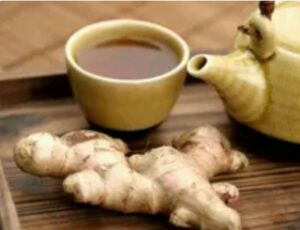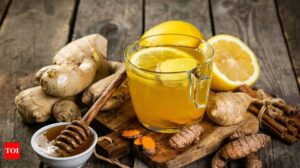Whether you’re seeking relief from nausea or pain, this soothing beverage may be beneficial. Ginger tea, used for centuries to treat various ailments, adds a unique flavour to food. Originating in Asia, ginger belongs to the Zingiberaceae plant family and is typically consumed in the form of its edible root or stem.
Ginger is an ancient herbal remedy known for its potential benefits in treating a variety of ailments, including arthritis, diabetes, coughs, colds, and nausea. It’s a versatile ingredient consumed in various forms in folk medicine, with ginger tea being a popular choice. You can easily prepare ginger tea by boiling the peeled root in water or milk.

In this article, we will explore the health benefits of drinking ginger tea. Additionally, it provides a simple recipe for you to follow and make your own ginger tea at home.
Ginger is a widely used ingredient globally, both as a spice and medicinal plant. In traditional medicine, it’s often used to treat coughs, the flu, and other ailments. Ginger is available in various forms, including fresh, pickled, powdered, dried, candied, preserved, and crystallized. You can also find ginger in capsules, tinctures, extracts, tablets, and tea.
Ginger tea is made by boiling the peeled ginger root in water or milk. The oils and compounds that give ginger its unique aroma and spicy flavour make up about 1-4% of the ginger root.
Gingerols and shogaols are two of the main bioactive components in ginger, responsible for most of its health benefits. Let’s explore some of the potential benefits of ginger tea you probably didn’t know.
8 Surprising Health Benefits of Ginger Tea
1. It’s an Anti-Inflammatory
Ginger, a superfood like turmeric and cardamom, contains gingerol, a natural anti-inflammatory and antioxidant. Anti-inflammatories help curb an overactive immune system.
Inflammation is a natural response to injury or illness, signalling white blood cells to heal. However, excessive inflammation is linked to diseases like celiac and fibromyalgia. Antioxidants, like those found in leafy greens, blueberries, and ginger, help reduce inflammation throughout the body.
2. It Relieves Muscle Pain
Ginger’s anti-inflammatory properties make it effective for relieving muscle and joint pain, including arthritis. A study found that athletes who took ginger supplements experienced reduced muscle pain after exercise. While foam rollers are helpful, consider adding ginger to your post-workout meal to ease sore muscles.
3. It Settles the Stomach
Ginger is known to soothe upset stomachs and curb nausea. It’s also a great drink after a heavy meal. A cup of ginger tea can help your stomach empty faster, preventing bloating and gas.
4. It Can Help Regulate Blood Sugar
Ginger’s most surprising health benefit is its ability to regulate blood sugar. This minimizes the negative symptoms of high blood sugar, which can lead to serious health problems like diabetes. Ginger supplementation can reduce fasting blood sugar and promote healthy blood sugar levels.
5. It Helps Prevent Heart Disease
Ginger can reduce lipoproteins, a major risk factor for heart disease. Combining ginger with Omega-3-rich salmon in a veggie stir-fry can promote heart health, thanks to the antioxidants in ginger and greens and the fatty acids in salmon.
6. It Reduces the Risk of Diabetes
Ginger helps regulate insulin and metabolism, reducing the overall risk of diabetes. While ginger-flavoured snacks can be enjoyable, keeping dried and fresh ginger on hand for flavouring smoothies, stir-fries, and soups is important. The drying process enhances some beneficial compounds in ginger.
7. It Eases Menstrual Pain
Ginger’s anti-inflammatory properties can alleviate menstrual cramps, making it as effective as ibuprofen, according to a 2009 study. This is great news for women who experience severe period pain. A cup of ginger tea can provide relief.
8. It Fights Infections
Ginger’s powerful anti-fungal and antimicrobial compounds can help combat colds and infections. For a cold-fighting boost, try mixing hot water with grated ginger, lemon juice, and honey, or ginger to chicken soup.
How to Make Ginger Tea at Home
Here’s a simple recipe for making your own ginger tea:
Ingredients:
4-6 thin slices of peeled, raw ginger (for stronger tea, add more slices)
2 cups (473 mL) water
Juice from half a lime or lemon
Honey or another sweetener, to taste (optional)
Instructions for Water-Based Ginger Tea:
1. Wash and scrub the ginger root.
2. Peel the ginger and slice it thinly.
3. Fill a medium pot with 2 cups of water.
4. Add the ginger slices to the water and bring it to a boil.
5. Reduce heat and simmer for 10-20 minutes. Simmer longer for spicier tea.
6. Remove from heat.
7. Add lime or lemon juice and honey to taste, if desired.
Serve in your favourite mug.
Instructions for Milk-Based Ginger Tea:
Boil ginger root slices in 1 cup (237 mL) of water for 10 minutes.
Remove from heat and add 2 cups (473 mL) of milk.
Return the pot to the stove and gently simmer the milk and ginger for 5 minutes.
Serve in your favourite mugs.










